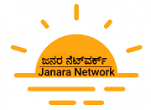NPM Paddy Farmers
- Home
- NPM Paddy Farmers
Direct Seeded Rice – Lesser Cost, Higher Yield
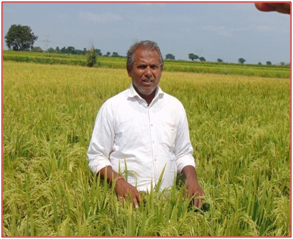
For the last 4 years paddy 56 farmers in Halasamudra, a village in Karatagi taluk of Koppal district, have been attending Farmer Field Schools (FFS’), supported by HUF (Hindustan Unilever Foundation). As a result they are now practitioners of LoWater paddy cultivation, as well as NPM (non pesticide management) practices.
A Critical component of this is Direct Seeded Rice (DSR). Ramanna, one of the LoWater NPM paddy practitioners shares his experience with DSR.
Ramanna says, “I am a member of the Shri Marutheshwara Farmer Group and we all regularly attend the Farmer Field School in our village.
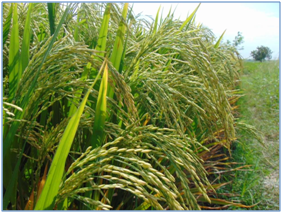
“This year, I decided to adopt DSR in 1 acre and 20 guntas.
Accordingly, Ramanna removed the weeds and, instead of standing water, let the water out, ensuring that the moisture was intact. He only applied the required amount of manure and neem cake. This method of cultivation saves time and money on nursery, transplantation, and puddling. Water saving is also high because transplantation method requires water to be retained on the field. This method also resists pest and disease attack. Earheads are also healthy.
Ramanna happily recalls, “I did not spray any chemical pesticides. I used bio pesticides like pseudomonas and panchagavya and chilli garlic paste instead. I removed weeds two times, applied manure at regular intervals, and watered it once in 15 days.”
Ramanna harvested 50 bags of paddy from 1.2 guntas, instead of the earlier 43 bags. In DSR method the cost is Rs 9000 per acre and a further Rs 4000 is saved on chemical manure.
Changing lifestyles and paddy varieties with DSR
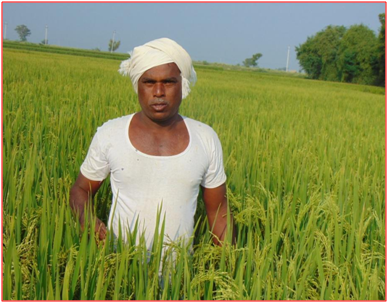
Mallangowda , a farmer from Muddapur, has been attending farmer field school regularly, and has been practicing DSR (Direct Seeded Rice)
Mallangowda belongs to a family of 13 who have been practicing agriculture in 15 acres.
The project extension team supported by HUF (Hindustan Unilever Foundation) undertook extensive extension. They also screened videos of the DSR success stories and testimonies of the farmers from the taluk using a LCD projector.
Mallangowda was inspired to try DSR method of sowing on his 15 acre land.
Earlier, Mallangowda was growing only Sona Masuri rice, and the process was tedious and expensive, with each acre costing him between Rs 25-30000. Sona masuri is a long duration crop, and pest and disease attack is extensive. BPH infestation is very high and to control this alone needed a cost of Rs 6-7000 per acre.
Because of the confidence he had in the extension team, he was encouraged to change both the varieties and method of sowing.
He put RNR in two acres, Janani in two acres, 1010 variety in two acres and BPT 5204 in three acres.
Mallangowda was awarded for his efforts and risk by getting a bumper yield in every variety:
1. RNR variety in 2 acres – 100 bags
2. Janani variety in 2 acres – 92 bags
3. 1010 variety in 8 acres – 400 bags
4. BPT 5204 variety in 3 acres – 144 bags.
From the 15 acres land, he grew 736 bags of paddy. His cost of production was Rs 18,500 per acre and Rs 277,500 overall. he sold his paddy for Rs 10,30,400, and earned a net profit of Rs 750,900. This year he also harvested 3 bags more per acre.
Mallangowda added, “The extension team has also advised me to grow grow different varieties of organic vegetables in my backyard. With a family of 13 members, we used to spend around Rs 500 per week on vegetables alone. Now that is a huge saving for us. We get poison free vegetables and the space around the house has been used well. I have now also planted sandalwood saplings.”
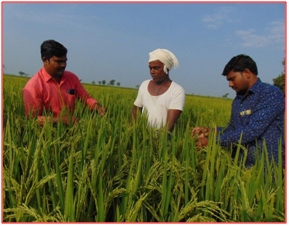
Mallangowda rears 5 buffaloes which give him 20 litres of milk every day.
“As we had grown different varieties of paddy, harvesting was early. We are now planning to go in for fodder variety as the second crop which should be enough for out buffaloes. At the same time, this will also retain soil fertility.
“I now want to start integrated farming, which will also allow me to contribute to growing poison free food.” says Mallangowda.
